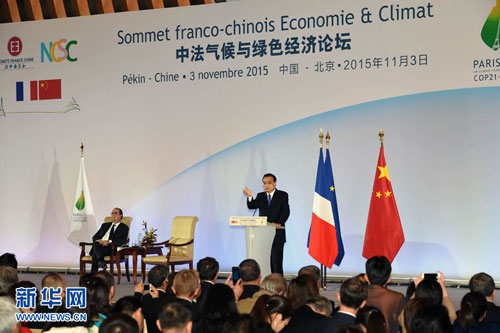
The People’s Republic of China



Beijing, 3 November 2015
Your Excellency President Francois Hollande,
Distinguished Guests,
Ladies and Gentlemen,
Dear Friends,
It is a great pleasure to join you at the closing ceremony together with President Hollande, and I wish to congratulate you on the successful Summit.
Co-hosted by China and France, the Summit will serve as a prelude to the upcoming UN Conference on Climate Change (COP 21) to be held in Paris.
Both China and France are permanent members of the UN Security Council. Our cooperation on climate change demonstrates the common responsibility we undertake as major countries on vital issues concerning the future of mankind, and it shows that China-France relations have been at the forefront of China's relations with major western countries. Yesterday, President Xi Jinping and President Hollande issued a joint statement on climate change. As I visited France last June, the Chinese government communicated its Intended Nationally Determined Contributions to the Secretariat of the United Nations Framework Convention on Climate Change. China highly commends the efforts made by France in addressing climate change and stands ready to work closely with France for a comprehensive, balanced and ambitious agreement at COP 21 according to the principles of common but differentiated responsibilities, equity and respective capabilities, thus making greater contributions to the sustainable development of mankind.
As we speak, global economic recovery remains weak, and downward pressure keeps mounting. Affected by the external environment, growth in China has also moderated. It is clear that the previous growth pattern that relies on over-consumption of natural resources is no longer sustainable. To achieve China's goal of becoming a moderately developed country by the middle of the century, we need to maintain a medium-high speed of growth for years and move to medium-high level of development. The current moderation of growth speed is also partly due to structural adjustments and the enforcement of strict environmental standards. This is a painful process of shifting growth model and growth drivers. Still, we must follow through this path to move away from over-reliance on natural resources and toward greater focus on human resources and new growth points. Only green development is sustainable development. There is great potential for green and environment-related industries.
China and France have started clean energy cooperation as early as the 1980s. Right now, China is pursuing a new type of industrialization and urbanization. The former calls for greater energy conservation, less consumption and more reliance on smart technologies, while the latter holds the potential of being China's biggest source of domestic demand with the urbanization rate just above 50%. For China to pursue a new type of urbanization, it needs more energy-saving materials for construction and other related sectors and more environment-friendly consumer goods for its people. If Chinese and French businesses can work together to meet the demands of Chinese consumers and foster new industries related to energy conservation and environmental protection, it will generate massive benefits for both sides. Thirty years ago, China chose French technology for the first unit of its Daya Bay Nuclear Power Plant, with an installed capacity of less than 1,000 MW. Now, the installed capacity of nuclear power in China both in operation and under construction exceeds 25 GW. There is still greater potential to be tapped.
For developing countries, climate change poses a challenge and combating it entails pain and pressure. But it will also bring sustained and healthy development of their economy. Therefore, green development is not only necessitated by China's shift of growth model and adjustment of economic structure, but is also our bounden responsibility as a major developing country and our contribution to the world. China will implement green development and other decisions adopted at the just-concluded Fifth Plenum of the 18th CPC Central Committee. China will pursue both economic growth and environmental improvement by transforming the growth model, adjusting the structure and improving the quality and performance of the economy. And that will open up new prospects for ecological conservation.
China and France may also jointly explore third-party market in energy-saving and environment-friendly industries. This will bring new technologies, new products and new concepts to the world and help emerging markets address downward economic pressure and achieve sustainable growth.
The fact that President Hollande chose to visit China prior to COP 21 shows that China and France share the same vision for tackling climate change and can forge synergy through cooperation. China looks forward to a successful Paris Conference and hopes that it will help identify new growth areas and pathways for the development of mankind. The outcomes of the Conference shall not only be written down in documents, but also reflected in concrete actions. To push for real results in shifting growth model and restructuring the economy, governments need to provide clear guidance, set standards and give policy support. But more importantly, the business community need to work with each other. It is China's hope that cooperation between the business community of our two countries on green development as well as energy conservation and environmental protection industries will deliver new progress. We hope that France will open up relevant technologies to China and the Chinese companies will honor the rules for intellectual property protection. As China and France deepen mutual trust and strengthen cooperation, we will create more business opportunities in our two countries and beyond, contribute to sustainable development of the global economy, and bring more benefits to the people of our two countries and across the world.
Thank you.


